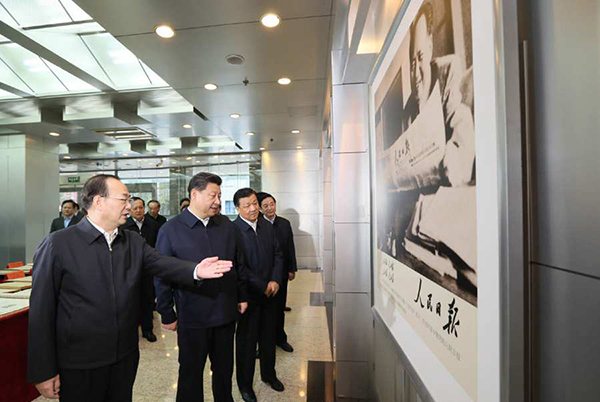Experts react to Xi’s media guidance

Chinese President Xi Jinping visits the headquarters of People's Daily in Beijing on Feb. 19. (PHOTO: XINHUA)
Scholars have put forward their views on remarks made during a recent visit to major media outlets by Chinese President and General Secretary of the CPC Central Committee Xi Jinping on Feb. 19.
After visiting China Central Television (CCTV), the People’s Daily and the Xinhua News Agency, Xi presided over a symposium on the CPC’s media work and delivered a speech in which he emphasized the need for Chinese media to adhere to the correct direction when guiding public opinion.
The CPC has always valued news reporting and public opinion, Xi said, emphasizing that the Party’s media work is crucial to state governance and national stability.
Scholars said that Xi’s speech outlined some essential components of his governance philosophy.
One noteworthy aspect of Xi’s speech was his insistence that the guidance of public opinion cover all areas and dimensions of communication, said Yu Guoming, a professor from the School of Journalism and Communications at Renmin University of China.
Yu said communication of core values has been hindered at multiple levels and by varied means. Also, blogs, forums, independently produced entertainment, advertisements and other channels operating outside of the mainstream media will face the test of “correct opinion guidance.” Whether they can pass the test depends on proper state guidance, he said.
Some other scholars said that Xi’s speech has enriched the theory of socialist journalism with Chinese characteristics.
Huang Xiaoxin, Party secretary of the Chinese Academy of Press and Publication, appealed to scholars of journalism and the press to study and comprehend Xi’s speech to gain a better understanding of policies concerning news reporting and public opinion. Media professionals and academics alike must innovate the means, content and form of media work to make news communication targeted and timely in order to cater to the psychological and social needs of the common people in the new age, he said.
For innovation purposes, it is necessary to capitalize on existing achievements of communication studies based on the current context and domestic demands to shape journalism and communication in a way that is unique to China, Huang said. This would enable CPC guidelines and policies to better resonate among the populace, facilitating the realization of the “Chinese dream,” he said.
The promotion of false, empty concepts should not be allowed, Huang said, urging innovations in journalism theory and media law as well as the integrated development of new characteristics, laws and paths in such aspects as research forms, content, topics, technologies, institutions and mechanisms.
All in all, we should innovate journalism and communication according to new features and demands, neither following the West blindly nor sticking to conventions, Huang added.
Huo Wenqi and Pan Yuefei are reporters at the Chinese Social Sciences Today.
